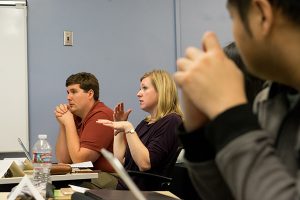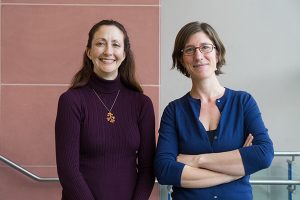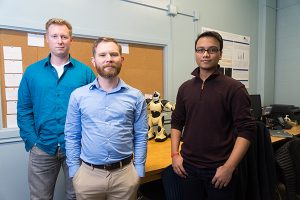
Professors applying for grants listen to Amy D’Andrade speak during the start of the University Grants Academy at San Jose State University on Friday, Feb. 3, 2017. (Photo: James Tensuan, ’15 Journalism)
By Barry Zepel
The thought of writing a research grant proposal can be a mind-boggling challenge for anyone who has never done it before. For a young faculty member with a full 12-unit load of classes, finding the time to do research – and pursue funding to support it – can seem impossible.
Sensing that anxiety from new instructors five years ago, Amy D’Andrade felt she and some of her colleagues in the College of Applied Sciences and Arts (CASA) could help by serving as mentors. They began teaching the many steps of grant writing to a few of their interested CASA associates to allay those fears.
From D’Andrade’s experimental program the professor in the School of Social Work created a campus-wide University Grants Academy (UGA). The program launched in 2015-16 with the enthusiastic support of the Office of Research, theResearch Foundation and the Center for Faculty Development.
“We thought about how a faculty member would benefit in order to maximize the chances of submitting proposals successfully,” said D’Andrade, who now has responsibilities as UGA director and associate dean of research for CASA.
process into smaller “essential elements: Time, Information, Idea-to-Proposal, Finding a Funder, Drafting a Budget, and Writing the Narrative.” The fall sessions were open to the all SJSU faculty.
This spring semester, 22 faculty members are continuing with the program. Each participant is working with a set of senior faculty mentors with successful grant writing experience, as well as with the support of grant writing experts from the Office of Research, the Research Foundation and University Advancement. To help them in their participation, each grant writing novice is given three units of assigned time to reduce their spring teaching schedule.
Meekyung Han, a professor of social work at SJSU since 2005, took part in last year’s UGA. She credits D’Andrade and John Lee, a professor of mechanical engineering, for providing strong guidance through the submission process of her first grant proposal “Breaking barriers to empowering family caregivers of persons with mental illness.”
“The UGA certainly enhanced my capacity to plan, develop, complete and submit an external grant proposal independently,” Han said. “My knowledge and confidence in writing a grant proposal for external funders have greatly improved. I successfully submitted my first federal grant proposal to the National Institutes of Health (NIH).”
Jordan Schettler, in his second year at SJSU as an assistant professor of mathematics, submitted a grant proposal on “Research Experiences for Undergraduates to the National Science Foundation. He credits the UGA and faculty members Michael Kaufman (Physics) and Julio Soto (Biology) for “providing tons of useful information.”
“I am a great deal better prepared,” Schettler said. “In particular, I have an infinitely richer understanding of the balance between the budget and the guidelines.”
Additional information about the UGA is available online or by emailing Amy D’Andrade.



 research, scholarship and creative activity conducted at our campus enrich the educational experience of our students while providing faculty and staff the opportunity for professional development. These activities elevate the reputation of our campus and boost our prominence as a world-class institution. We have greatly expanded RSCA resources at SJSU and I am especially proud to share our accomplishments this month.
research, scholarship and creative activity conducted at our campus enrich the educational experience of our students while providing faculty and staff the opportunity for professional development. These activities elevate the reputation of our campus and boost our prominence as a world-class institution. We have greatly expanded RSCA resources at SJSU and I am especially proud to share our accomplishments this month.